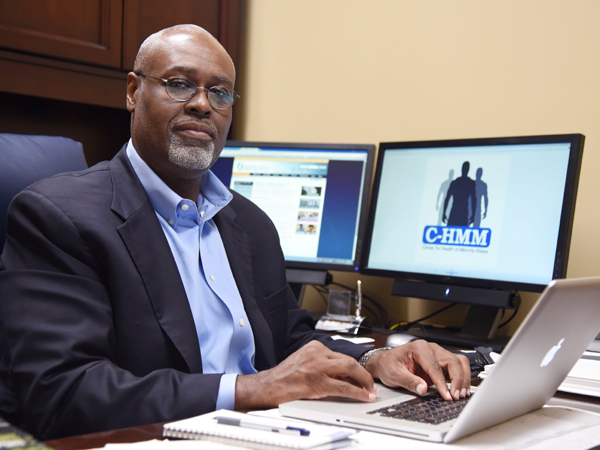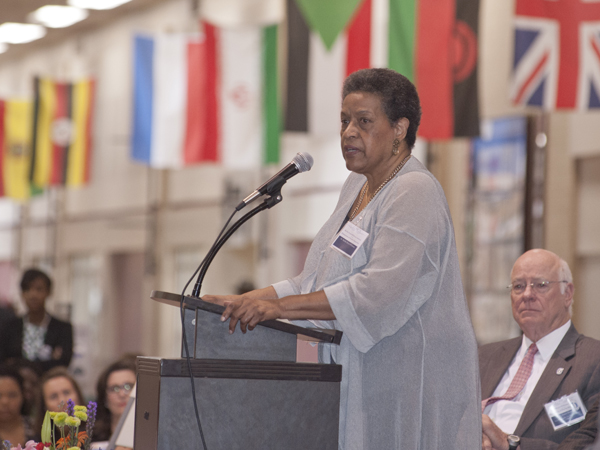Center focuses on overlooked population

For the last several years, a group of researchers at the University of Mississippi Medical Center has pored over studies to determine the health risks facing minority males in the state.
From a higher propensity for developing chronic kidney disease at an earlier age to having on average a shorter life span, the statistics have shown a health-care disparity among minority males, particularly African-American men, said Dr. Marino Bruce, director of the Center of Health for Minority Males (C-HMM), part of the University of Mississippi Medical Center's Myrlie Evers-Williams Institute for the Elimination of Health Disparities.
The reasons are numerous, the answers murky. But the lack of a primary health-care physician - or medical home - among minority males is one of the first problems believed to face the population, said Bruce, an affiliate faculty member at UMMC's School of Medicine and professor of criminal justice and sociology at Jackson State University.
"The question that we have to ask and have answered is, 'What are the ways in which we can encourage minority males in particular to have a medical home?'" said Bruce.
"Minority males - particularly African-American males - don't have medical homes, but that's the group that's most likely to have early onset of disease," he added.
Bruce said African-American males have the shortest lifespans among populations, and when looking at heart disease, kidney disease and cancer, the same group tends to have an earlier onset.
"Hypertension," he added. "We're talking about hypertension in folks that are barely 20 years old. College-age African-American males are twice as likely to have hypertension as white males the same age."

The increased likelihood of African-American males developing hypertension at a younger age - even in their 20s - can be further compounded by weight issues, said Bruce. This increases the risk of a serious cardiac event to four or five times greater than healthy individuals.
"And both of those are largely preventable," said Bruce.
These issues - their causes and, it is hoped, solutions - are why C-HMM is around, said Bruce.
"The disparities among men of color, particularly African-American males, compared to their Caucasian counterparts is a national problem," said Dr. Bettina Beech, UMMC's associate vice chancellor for population health and director of the Evers-Williams Institute.
At the dedication of the institute last year, Beech said Dr. Myrlie Evers-Williams asked for a focus to be placed on men's health.
"We've taken that charge quite seriously," said Beech.
Understanding the health risks is only part of the battle.
Deciphering why minority males are less likely to have a medical home is another piece of the puzzle, said Bruce.
"Some will say it's often insurance. Others say a lot of men don't go to the doctor," said Bruce. "But I'm not one that assumes that what we see as a barrier is actually a barrier. That's actually something that we need to ask. If I have data, I'll analyze it to see. But we can't always assume people don't go to the doctor because they are not insured. That's a real barrier, but we don't know to what degree that it varies by gender."
C-HMM researchers and Bruce are often asked why they only look at mostly African-American samples in their research.
"My response is we have a number of things going on within a group that we have yet to explore," he said. "But what I've found with respect to health disparities is that the research comparing whites to blacks pretty much tells us information we already know.
"I want to get at why is it that African-American men have an elevated blood pressure. Do we have variations among levels within a group? Of course we do. But why?"
Bruce said part of the work at C-HMM is fueled by those types of questions, moving toward evidence-based research to find the answers.
"Those findings lead to other studies which lead to other findings which lead to other types of research," he said. "The more evidence we have, the better our interventions will be."
Bruce said everyone loses when a significant portion of the state's residents are not well. The impact can be felt on families, communities and, ultimately, the state of Mississippi.
"We haven't focused a great deal on the health of minority males, but we should because families and communities are suffering because a lot of males are sick. It all has a negative impact," Bruce said.
"We say these things are preventable, but how are we preventing them? It's more than just saying to exercise and eat right. You need to think about sleep, about stress, and what are the lives these people are living that lend themselves to poor health outcomes.
"When we start asking those questions, we'll get somewhere," he added.
"Our mission and goals align with those of the Medical Center," said Beech, of both the institute and C-HMM. "We are conducting research, examining a large cohort of minority males throughout their lives. We're working with patients and identifying social factors that impact their care. With education, we are focusing on the research and training of underrepresented minority faculty."


